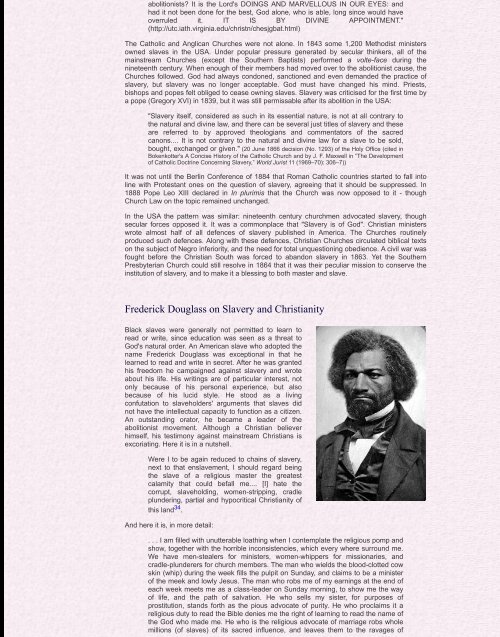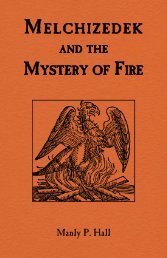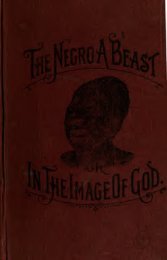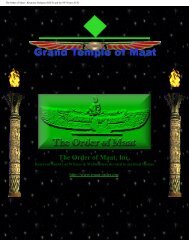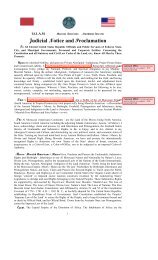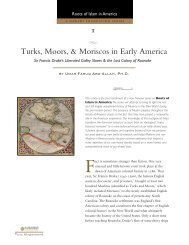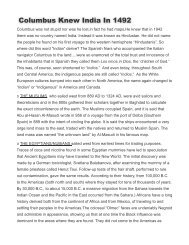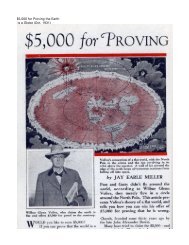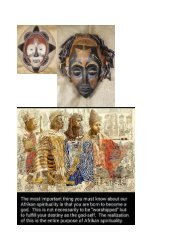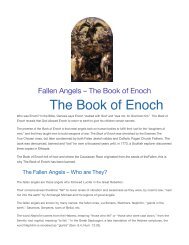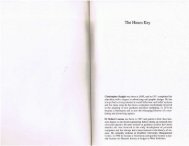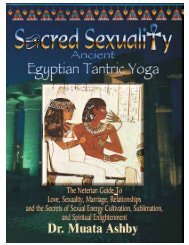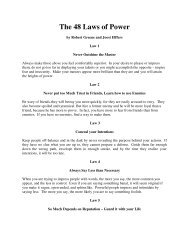Christian Slavery - Bad News About Christianity
You also want an ePaper? Increase the reach of your titles
YUMPU automatically turns print PDFs into web optimized ePapers that Google loves.
abolitionists? It is the Lord's DOINGS AND MARVELLOUS IN OUR EYES: and<br />
had it not been done for the best, God alone, who is able, long since would have<br />
overruled it. IT IS BY DIVINE APPOINTMENT."<br />
(http://utc.iath.virginia.edu/christn/chesjgbat.html)<br />
The Catholic and Anglican Churches were not alone. In 1843 some 1,200 Methodist ministers<br />
owned slaves in the USA. Under popular pressure generated by secular thinkers, all of the<br />
mainstream Churches (except the Southern Baptists) performed a volte-face during the<br />
nineteenth century. When enough of their members had moved over to the abolitionist cause, the<br />
Churches followed. God had always condoned, sanctioned and even demanded the practice of<br />
slavery, but slavery was no longer acceptable. God must have changed his mind. Priests,<br />
bishops and popes felt obliged to cease owning slaves. <strong>Slavery</strong> was criticised for the first time by<br />
a pope (Gregory XVI) in 1839, but it was still permissable after its abolition in the USA:<br />
"<strong>Slavery</strong> itself, considered as such in its essential nature, is not at all contrary to<br />
the natural and divine law, and there can be several just titles of slavery and these<br />
are referred to by approved theologians and commentators of the sacred<br />
canons.... It is not contrary to the natural and divine law for a slave to be sold,<br />
bought, exchanged or given." (20 June 1866 decision (No. 1293) of the Holy Office (cited in<br />
Bokenkotter's A Concise History of the Catholic Church and by J. F. Maxwell in “The Development<br />
of Catholic Doctrine Concerning <strong>Slavery</strong>,” World Jurist 11 (1969–70): 306–7))<br />
It was not until the Berlin Conference of 1884 that Roman Catholic countries started to fall into<br />
line with Protestant ones on the question of slavery, agreeing that it should be suppressed. In<br />
1888 Pope Leo XIII declared in In plurimis that the Church was now opposed to it - though<br />
Church Law on the topic remained unchanged.<br />
In the USA the pattern was similar: nineteenth century churchmen advocated slavery, though<br />
secular forces opposed it. It was a commonplace that "<strong>Slavery</strong> is of God". <strong>Christian</strong> ministers<br />
wrote almost half of all defences of slavery published in America. The Churches routinely<br />
produced such defences. Along with these defences, <strong>Christian</strong> Churches circulated biblical texts<br />
on the subject of Negro inferiority, and the need for total unquestioning obedience. A civil war was<br />
fought before the <strong>Christian</strong> South was forced to abandon slavery in 1863. Yet the Southern<br />
Presbyterian Church could still resolve in 1864 that it was their peculiar mission to conserve the<br />
institution of slavery, and to make it a blessing to both master and slave.<br />
Frederick Douglass on <strong>Slavery</strong> and <strong>Christian</strong>ity<br />
Black slaves were generally not permitted to learn to<br />
read or write, since education was seen as a threat to<br />
God's natural order. An American slave who adopted the<br />
name Frederick Douglass was exceptional in that he<br />
learned to read and write in secret. After he was granted<br />
his freedom he campaigned against slavery and wrote<br />
about his life. His writings are of particular interest, not<br />
only because of his personal experience, but also<br />
because of his lucid style. He stood as a living<br />
confutation to slaveholders' arguments that slaves did<br />
not have the intellectual capacity to function as a citizen.<br />
An outstanding orator, he became a leader of the<br />
abolitionist movement. Although a <strong>Christian</strong> believer<br />
himself, his testimony against mainstream <strong>Christian</strong>s is<br />
excoriating. Here it is in a nutshell.<br />
Were I to be again reduced to chains of slavery,<br />
next to that enslavement, I should regard being<br />
the slave of a religious master the greatest<br />
calamity that could befall me.... [I] hate the<br />
corrupt, slaveholding, women-stripping, cradle<br />
plundering, partial and hypocritical <strong>Christian</strong>ity of<br />
this land 34 .<br />
And here it is, in more detail:<br />
. . . I am filled with unutterable loathing when I contemplate the religious pomp and<br />
show, together with the horrible inconsistencies, which every where surround me.<br />
We have men-stealers for ministers, women-whippers for missionaries, and<br />
cradle-plunderers for church members. The man who wields the blood-clotted cow<br />
skin (whip) during the week fills the pulpit on Sunday, and claims to be a minister<br />
of the meek and lowly Jesus. The man who robs me of my earnings at the end of<br />
each week meets me as a class-leader on Sunday morning, to show me the way<br />
of life, and the path of salvation. He who sells my sister, for purposes of<br />
prostitution, stands forth as the pious advocate of purity. He who proclaims it a<br />
religious duty to read the Bible denies me the right of learning to read the name of<br />
the God who made me. He who is the religious advocate of marriage robs whole<br />
millions (of slaves) of its sacred influence, and leaves them to the ravages of


